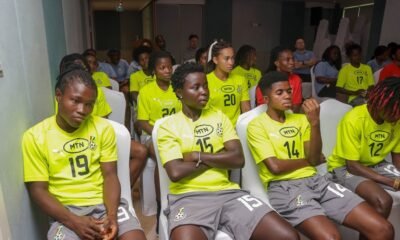News
Govt urged to provide safe, supportive environment for menstruating girls

The government has been urged to take urgent steps toward providing a safe and supportive environment for menstruating girls to ensure proper personal hygiene and promote school attendance.
Sarah Nkansah Boateng, a midwife at the Eastern Regional Hospital made the call during a forum organised as part of activities to observe Menstrual Hygiene Day celebration in the New Juaben North Municipality of the Eastern Region.
The event was held under the theme “Together for a Period-Friendly World.”
She noted that many girls skip school during their menstrual periods due to a lack of access to sanitary products and appropriate spaces to change them.
“The basic necessities for these girls are not being provided; creating a safe and enabling environment is crucial,” Madam Boateng emphasized.
She called on school authorities and policymakers to prioritise the construction of hygienic and private changing spaces in schools.
She further appealed for a collective effort to address menstrual health challenges affecting girls in the community.
The New Juaben North Municipal Director of Health Services, Nana Yaa Konadu, also highlighted her office’s initiatives in both school-based and community clinics to educate young girls on menstrual hygiene.
She stressed the health implications of poor menstrual hygiene, saying, “When girls lack access to sanitary pads and a clean environment, it can negatively impact their reproductive health.”
Madam Konadu warned that the absence of menstrual hygiene facilities and products left some girls vulnerable to exploitation, increasing the risk of teenage pregnancy.
The Municipal Chief Executive for New Juaben North, Mr Samuel Adongo, described menstruation as a natural biological process and not a taboo or burden.
He expressed concern over the poor state of sanitation facilities in schools.
“I have visited almost all public schools in the municipality, and none has a proper, standard toilet facility suitable for girls,” he stated.
Mr Adongo assured that the assembly would work to create an enabling environment to reduce school absenteeism related to menstruation.
“Too many girls are missing school because of their menstrual cycle, and this is unacceptable,” he added.
From Ama Tekyiwaa Ampadu Agyeman, Koforidua
News
Man sentenced to 25 years for robbery at Manso Akwasiso

A 30-year-old man has been sentenced to 25 years imprisonment with hard labour by the Bekwai Circuit Court for his role in a 2022 robbery at a mining site at Manso Akwasiso in the Ashanti South Region.
The convict, Dominic Ofori, also known as Fanta, was arrested on 16th February 2026 after years on the run. He pleaded guilty before the Bekwai Circuit Court to robbery contrary to Section 149 of the Criminal Offences Act, 1960 Act 29, and was accordingly sentenced to 25 years imprisonment with hard labour.
On March 20, 2022, the Manso Adubia District Police received intelligence that a group of armed men from Manso Abodom were planning to attack a mining site at Manso Akwasiso to rob the owner of gold concentrate. Acting on the information, police mounted a coordinated operation and laid an ambush at the site.
At about 5:30 pm the same day, four-armed men arrived at the site, fired indiscriminately, and robbed the miners of their gold concentrate. The police team on surveillance intervened, resulting in an exchange of gunfire.
Three of the suspects, Abu Abubakar, Musah Latif, and Gideon Takyi, sustained gunshot wounds and were pronounced dead on arrival at St Martins Catholic Hospital at Agroyesum. Dominic Ofori escaped at the time but was later arrested and put before the court.
The Ashanti South Regional Police Command has assured the public of its continued commitment to combating violent crimes and bringing offenders to justice.
News
Ashanti police arrest man for publishing false news on TikTok

The Ashanti Regional Police Command has arrested 45-year-old Isaac Boafo, also known as “Duabo King,” for allegedly publishing false news intended to cause fear and panic.
Police said the arrest follows a viral TikTok video in which Boafo claimed that four officers at the Central Police Station in Kumasi engaged in inappropriate conduct with commercial sex workers during night patrols in Asafo.
Officers from the Police Intelligence Directorate (Ashanti Region) apprehended Boafo after receiving intelligence about the video.
During questioning, he admitted to creating the video to attract views and engagement online, and acknowledged that he could not prove the allegations.
Boafo also admitted making comments about the President of the Republic for content purposes and could not defend those statements.
He has been formally charged and is in detention as investigations continue.
The Ashanti Regional Police have warned the public against publishing or sharing false information on social media, noting that such acts can cause fear, panic, and damage reputations.
They said anyone found engaging in similar conduct will face legal action.
By: Jacob Aggrey














